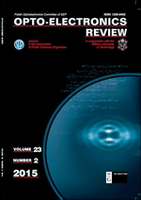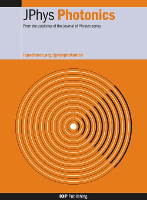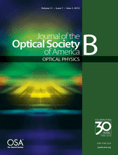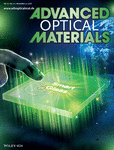
JOURNAL OF OPTOELECTRONICS AND ADVANCED MATERIALS
metrics 2024
Driving Excellence in Optoelectronics and Material Science
Introduction
JOURNAL OF OPTOELECTRONICS AND ADVANCED MATERIALS, published by the NATL INST OPTOELECTRONICS in Romania, is an esteemed academic journal dedicated to disseminating innovative research in the fields of optoelectronics and advanced materials. With an ISSN of 1454-4164 and E-ISSN 1841-7132, the journal provides a platform for researchers to share their findings and technological advancements from 1999 to 2024. Despite being placed in the Q4 quartile across several categories—including Atomic and Molecular Physics, Condensed Matter Physics, and Electrical and Electronic Engineering—the journal serves as an essential resource for highlighting significant developments in its respective fields. Researchers and professionals may find valuable insights that foster collaboration and inspire further investigation, thereby contributing to the continuous evolution of optoelectronics and materials science.
Metrics 2024
 0.18
0.18 0.60
0.60 0.40
0.40 53
53Metrics History
Rank 2024
Scopus
IF (Web Of Science)
JCI (Web Of Science)
Quartile History
Similar Journals

SEMICONDUCTORS
Pioneering insights in condensed matter physics.SEMICONDUCTORS, published by PLEIADES PUBLISHING INC, is a prominent journal that provides a platform for researchers and professionals in the fields of Atomic and Molecular Physics, Condensed Matter Physics, and Electronic, Optical and Magnetic Materials. With an ISSN of 1063-7826 and an E-ISSN of 1090-6479, the journal has been diligently disseminating knowledge since its inception in 1996 and continues to pave the way for innovative research until 2024. Although currently unclassified in the Open Access model, its influence is underscored by its rankings in Scopus, where it ranks in the 21st-22nd percentile across critical scientific categories. SEMICONDUCTORS serves as an essential resource for cutting-edge research, fostering a greater understanding of semiconductor materials and their applications, thereby assisting the scientific community in pushing the boundaries of technology and innovation.

Frontiers of Optoelectronics
Pioneering Research in Electrical and Optical EngineeringFrontiers of Optoelectronics is a prestigious peer-reviewed journal published by HIGHER EDUCATION PRESS, focusing on the rapidly evolving fields of electrical engineering, optical science, and material science. With its inception in 2012 and an impressive impact factor achieved by being ranked Q1 in both Electrical and Electronic Engineering and Electronic, Optical and Magnetic Materials as of 2023, this journal exemplifies excellence in research dissemination. Operating under an Open Access model since 2022, it ensures timely and widespread accessibility to cutting-edge advancements and innovative applications in optoelectronics, making it an essential resource for researchers, professionals, and students alike. The journal is indexed in Scopus, with notable ranking positions—Rank #143/797 in Electrical and Electronic Engineering and Rank #55/284 in Electronic, Optical and Magnetic Materials—highlighting its significant contribution to the academic community. Based in Beijing, China, the journal fosters a global dialogue around key technological trends, ultimately driving further development in the field.

Materials Letters-X
Catalyzing Collaboration Across Scientific DisciplinesMaterials Letters-X, published by ELSEVIER, is an esteemed open-access journal dedicated to the rapid communication of research in the fields of Condensed Matter Physics, Materials Science, Mechanical Engineering, and Mechanics of Materials. Launched in 2019, this journal has quickly established itself within the academic community, achieving Q3 quartile rankings in several categories according to the 2023 metrics. The journal's impactful contributions are reflected in its Scopus rankings, notably within Mechanical Engineering (Rank #308) and Mechanics of Materials (Rank #199). The open-access model promotes widespread dissemination and accessibility, ensuring that cutting-edge advancements in material science are readily available to researchers, professionals, and students worldwide. As it continues to grow, Materials Letters-X aims to inspire innovation and collaboration across disciplines, making it a pivotal resource for those engaged in material research and applications.

OPTO-ELECTRONICS REVIEW
Transforming Ideas into Optoelectronic BreakthroughsOPTO-ELECTRONICS REVIEW, published by the Polish Academy of Sciences, is a prestigious peer-reviewed journal that has been at the forefront of research in the fields of electrical and electronic engineering, materials science, and radiation since its inception in 1996. With an ISSN of 1230-3402 and an E-ISSN of 1896-3757, the journal serves as a vital platform for disseminating high-quality research that explores the intersection of optoelectronics with cutting-edge technological advancements. Operating from its headquarters in Warsaw, Poland, OPTO-ELECTRONICS REVIEW reaches an international audience, contributing significantly to the body of knowledge in its categorically ranked quartiles, specifically Q3 in Electrical and Electronic Engineering and Materials Science for 2023. Researchers will find valuable insights as the journal continues to embrace emerging trends while maintaining rigorous academic standards. Although currently not open access, the journal remains an essential resource for professionals and students seeking to enhance their understanding and application of optoelectronic technologies.

Journal of Physics-Photonics
Pioneering Research at the Intersection of Light and ScienceJournal of Physics-Photonics, published by IOP Publishing Ltd in the United Kingdom, is an esteemed Open Access journal that has been at the forefront of research in the field of photonics since its inception in 2018. With an impressive portfolio, the journal has achieved Q1 ranking in 2023 across multiple disciplines, including Atomic and Molecular Physics, Electrical and Electronic Engineering, and Electronic, Optical, and Magnetic Materials. This positions it among the leading journals in these areas, reflecting its significant influence and contribution to advancing knowledge and innovation. The journal aims to disseminate high-quality research findings that encompass a wide range of topics in photonics, promoting interdisciplinary approach that fosters collaboration among researchers, professionals, and students. With its commitment to open access, Journal of Physics-Photonics ensures that groundbreaking research is accessible to all, empowering a global audience to engage with and benefit from the latest advancements in photonic technologies.

Journal of Optoelectronic and Biomedical Materials
Bridging Disciplines for a Healthier TomorrowJournal of Optoelectronic and Biomedical Materials (ISSN: 2066-0049) is a peer-reviewed academic journal published by the renowned VIRTUAL INSTITUTE OF PHYSICS, dedicated to advancing research in the interdisciplinary fields of optoelectronics and biomedical materials. This journal aims to provide a platform for researchers, professionals, and students to disseminate their findings on innovative materials and technologies that harness optical and electronic properties for biomedical applications. With an increasing significance in medical diagnostics, therapeutic approaches, and advanced materials science, the Journal of Optoelectronic and Biomedical Materials underscores the importance of facilitating collaboration among scientists from diverse fields. While currently operating under a traditional access model, the journal aspires to enhance global accessibility to cutting-edge research contributions that will drive the future of technology in healthcare and biotechnology. As a growing reference point in its domain, it encourages submissions that can advance these crucial scientific areas.

Advanced Electronic Materials
Catalyzing Innovation in Electronic MaterialsAdvanced Electronic Materials is an esteemed journal published by Wiley, dedicated to the forefront of materials science, particularly in the areas of electronic, optical, and magnetic materials. With a commendable impact factor that places it in the Q1 quartile of its category and a Scopus rank of 36 out of 284, the journal is a vital resource for researchers, professionals, and students aiming to contribute to this rapidly evolving field. Launched in 2015 and fully transitioned to Open Access in 2023, the journal promotes widespread dissemination of knowledge, ensuring accessibility to groundbreaking research findings. With its address located in Germany at 111 River St, Hoboken 07030-5774, NJ, it serves a global academic community eager to explore innovative materials technologies that influence diverse applications ranging from consumer electronics to advanced manufacturing. As researchers seek to push the boundaries of what is possible with materials, Advanced Electronic Materials stands as a premier platform for sharing, discovering, and advancing knowledge in this essential domain.

JOURNAL OF ELECTRONIC MATERIALS
Elevating Knowledge in Condensed Matter Physics and BeyondWelcome to the Journal of Electronic Materials, a premier publication in the field of materials science. Published by Springer, this esteemed journal has been a beacon for groundbreaking research in electronic, optical, and magnetic materials since its inception in 1972. As an established resource, it boasts a commendable impact factor and categorically ranks in the second quartile (Q2) in key areas such as Condensed Matter Physics and Electrical and Electronic Engineering, as well as holding a respectable third quartile ranking in fields related to Electronic, Optical, and Magnetic Materials and Materials Chemistry. Researchers, professionals, and students can access a wealth of knowledge as we publish original articles, reviews, and cutting-edge research that push the boundaries of science and technology in these critical fields. Stay informed and engaged as we explore advancements that shape the future of electronic materials.

JOURNAL OF THE OPTICAL SOCIETY OF AMERICA B-OPTICAL PHYSICS
Connecting Researchers to the Heart of Optical ScienceJOURNAL OF THE OPTICAL SOCIETY OF AMERICA B-OPTICAL PHYSICS, published by Optica Publishing Group, serves as a leading platform for groundbreaking research in the fields of optical physics, atomic and molecular physics, and statistical and nonlinear physics. With an ISSN of 0740-3224 and an E-ISSN of 1520-8540, this esteemed journal has been in circulation since 1984 and is dedicated to advancing the understanding of optical phenomena and related technologies. It holds a commendable position in the academic community, with a 2023 Scopus ranking reflecting its significance—placing it in the top quartile for both Atomic and Molecular Physics and Statistical and Nonlinear Physics. Although it is not an open-access publication, it provides extensive access options to ensure that research is disseminated effectively within the scientific community. This journal is instrumental for researchers, professionals, and students alike, aiming to keep them informed of the latest advancements and trends in optical science. With a convergence of expertise and innovation, JOSA B continues to play a pivotal role in shaping the future of optical research.

Advanced Optical Materials
Shaping Tomorrow’s Innovations in Material ScienceAdvanced Optical Materials, published by WILEY-V C H VERLAG GMBH, stands as a premier journal within the fields of atomic and molecular physics, as well as electronic, optical, and magnetic materials. With a substantial impact factor reflecting its significance—ranking in the Q1 category among both Atomic and Molecular Physics and Electronic, Optical and Magnetic Materials—this journal offers a vital platform for disseminating groundbreaking research. The journal's Scopus rank positions it at an impressive 14th out of 224 in its category and 25th out of 284 in materials science, illustrating its commitment to advancing knowledge and innovation. Covering a diverse range of topics and trends from 2013 to 2024, Advanced Optical Materials is essential for researchers, professionals, and students who are exploring the cutting-edge developments in optical technologies. Despite not being open access, the journal provides high-quality peer-reviewed articles that contribute substantially to the academic community, helping to shape the future of materials research.